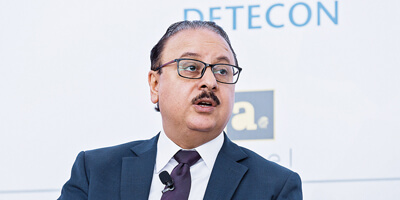
Topics ranging from 4G services and fiber-to-the-home, to 5G testing and smart cities were discussed in an exclusive interview with H.E. Eng. Yasser El Kady, Minister of Communications and Information Technology of Egypt. In an attempt to transform Egypt into a digital country, the ministry of communications and information technology is executing projects and collaborating with the private sector to implement Egypt’s digital transformation strategy, said El Kady to Telecom Review.
As for the future of the ICT sector in Egypt, Minister El Kady stressed the importance of reinforcing the capacities of startups and entrepreneurs who are building the sector’s future, and saluted their endeavors aimed at boosting innovation.
Now that the 4G services have been launched in the country, could you please share with us your opinion about the current telecom scene, especially after the incumbent launched its own mobile service?
When I first came into office, I worked hard to ensure that the telecom industry in Egypt was enabling and inviting. We shared our vision with the community and embarked on an aggressive plan for implementation. Collaboratively, our regulatory body, the National Telecom Regulatory Authority (NTRA), and the industry worked on executing this reform plan that encompassed advancing the infrastructure, developing the regulatory environment, developing human capacities as well as creating intellectual and value added output.
With the rollout of the new 4G services, competition dynamics changed and new trends in the industry evolved which resulted in quality services for the consumer and an overall healthier industry. Operators focus now on their growth objectives and the introduction of novel services emphasizing loyalty to the market. Operators are eager to participate in Egypt’s mega projects.
With no doubt, the new entrant has enriched the market, and this was one of the objectives of the NTRA especially after the new 4G license was put into effect. We aim for real and fair competition ensuring the rights and interests of the operators.
Telecom Egypt (TE) is the key player in infrastructure development. It was important to work on empowering its executive management first before it made its comeback within the market. TE aims to expand regionally and to offer integrated communication services keeping abreast with digital trends and growing smart services. As a matter of fact, in less than two months, the company was able to attract two million new subscribers for its mobile arm, ‘We’.
Telecom Egypt was the first company to take up the state’s original offer and buy a 4G license. Did this return on investment (ROI) pay back for ‘We’ and for the other operators?
It is too early to measure the ROI, but the results for all operators during the past few months have been positive and encouraging. Notably, all four operators have expressed commitment to the market through diversified means of investment.
Currently, operators are focusing on improving the consumer user experience, capitalizing on available technology to meet people’s day-to-day needs and introducing innovative services to support socio-economic development. Notable public services recently introduced in the market attend to the social services, health, education and financial sectors.
The increasing demand on frequency spectrum is a true indicator that 4G rollout has been a successful experience for both the operators and the consumers, and investments are pouring in to meet this growing demand. Now is the most suitable time for operators to identify the market opportunities and seize it. Diversified revenue schemes such as paid services and OTTs are starting to be offered in the market and there is a growing need from a niche consumer base. This is paving the way for innovative services due to be introduced when 5G is rolled out, with strong prospects for IoT and e-commerce to surely kick-off.
What can you tell us about the status of fiber-to-the-home deployment in Egypt?
I have been overseeing the implementation of a massive plan of modernizing the telecom infrastructure of Egypt, which started with removing the copper cables and replacing them with FTTH/B nationwide. Telecom Egypt has completed close to 60% of this plan, work is steadily progressing and a clear impact is felt by the consumer.
Notably, TE is deploying almost 12500 MSANs to provide a higher quality broadband service nationwide with a special focus on new urban communities. TE’s deployment plan of FTTB/H infrastructure avails speeds up to 2.5 Gbps to customers as part of a large-scale project totaling 50000 FTTH links. FTTH/B is indispensable to Egypt’s digital transformation plan which aims for an engaged digital society and a vibrant knowledge economy.
The ITU will announce the spectrum standardization of 5G in 2018. Is Egypt ready for 5G testing?
Egypt successfully completed initial 5G technology tests last December. This effort is part of the global research activities undertaken by different industry stakeholders to conduct technical and market trials. Egypt is an active participant in this initiative which is championed by the ITU.
As explained earlier, last September, operators launched their 4G services introducing new service bundles with a new level of customer experience. Building on the growing potential, the NTRA officially announced that it is looking at offering the four operators new frequency bands to meet the growing technology-related needs of the Egyptian society.
Egypt earlier announced plans to establish new smart cities in the country. Can you please share your vision?
HE President El Sisi has instructed that all new nine cities due to be developed are to be smart. This is in addition to the technology zones and the new administrative capital. MCIT works in partnership with the various stakeholders and technology innovators to introduce integrated smart and scalable solutions to support such mega projects.
Egypt’s knowledge city, located within the administrative capital, will focus its research on activities which will serve the needs of these smart cities. International and regional investors, research entities, training and entrepreneurship centers as well as universities have expressed interest in being part of the city’s core community. It is due to be built over 301 feddans starting 2018.
In your opinion, is creating digital Egypt possible?
On behalf of the government, MCIT is leading the digital transformation agenda of the country, a journey composed of several mega projects and implemented in partnership and collaboration with other government and public sector stakeholders.
We eye global trends and experiences, and Egypt’s digital transformation strategy promises to offer what’s new and disruptive. Our plan has the potential to significantly offer unique services and opportunities to empower a digitally-driven society. The new approach we are trying to introduce within the government embraces diverse ways of delivering services to 100 million citizens and beyond. Egypt’s ICT community has proven experience in scaling projects.
Building on this potential, a progressive approach of MCIT aims to change the culture of the purchasing mechanism within the government by jointly engaging SMEs and utilizing the expertise of the global technology providers.
To support our progressive plans and mega projects, we are heavily investing in capacity building and research in AI, VR, Blockchain, IoT and many other advanced technologies. We aim to be active participants in the global innovation scene and not remain as mere consumers of such technologies. Egypt’s new smart cities, the administrative capital and technology zones will experience first-hand the rollout of the various smart management systems powered by advanced technologies developed and tested locally.
Currently, some countries are allowing the trading of digital currencies. Will Egypt set up regulations for digital currencies and make it legal?
Egypt’s central bank has officially announced that it does not acknowledge digital/ virtual currencies so there is no intention to issue a regulatory framework or law for legalizing their dealings for the time being, and we honor this decision. As for technologies such as Blockchain, we support research and development in this arena and plan to invest in local cadres to become experts in this flourishing technology worldwide. The government aims to offer its citizens safe, transparent and secure services; and investing in the development of the technology is necessary to reach efficiency, and gain international ground.
Egypt launched its first locally manufactured smartphone. How did the government facilitate its launch and how will it contribute to boosting innovation in the country?
In 2015, the government set a progressive strategy for local development of electronics design and manufacturing. The strategy spearheaded by MCIT called for enabling the environment and creating need. Efforts were mobilized to upgrade laws and regulations to fit Egypt’s future technology needs; this was clearly translated in Egypt’s new Investment Law by dedicating a full chapter to potential investments in technology zones identifying opportunities, incentives and exemptions. Concurrently, we worked on creating technology zones in strategic locations within Egypt where innovation is the key enabler and manufacturing has strong presence; this effort is coupled by implementing a sustainable plan for developing capacities to meet current and future market needs.
MCIT has welcomed all initiatives related to manufacturing, design, innovation, and supported initial startups as well as global partnerships. Part of the government support aims at ensuring that local manufacturers and service providers satisfy local demand and export to the region.
With mobile penetration exceeding 100% and the monthly subscription growth steady, the Egyptian market is eager to embrace more mobile handset owners and service subscribers. Local sales of smartphones have surged and continue to increase after the successful launch of 4G services and user experience has been positive. Global device brands present in Egypt have started their service, innovation and R&D centers. We strongly believe that R&D is key to solidifying Egypt’s position as a hub for design and manufacturing. With this understanding in mind, heavy government investments are placed in diversified innovation schemes.
SICO technology was one of the first beneficiaries of this government support. The company’s manufacturing facility is in the technology zone of Assiyut el Gedida: built over 4520msq and can produce 1.8 million devices per year with 45% local components. Its first series of smartphones were launched during CairoICT2017, Egypt’s leading technology show and conference. Other firm’s production facilities are currently materializing in technology zones, an example of which is for fiber optics.
How do you see the future of the ICT sector in Egypt?
Favorable. The future is in the hands of young innovators. We laid the foundation and are currently working to build a promising environment for the technology industry to flourish nationwide. Our work involves advocating for a stable and fair regulatory atmosphere, as well as eliminating unnecessary barriers to support the various emerging technology-related business models.
As a matter of fact, the government is investing heavily in creating an ecosystem for value creation and entrepreneurship; correspondingly, leading firms including telcos recently introduced various initiatives individually or in partnership with the government to support the local budding startup scene.
The ICT industry is a driver for other sectors of the economy. Industry players are engaging in mega projects related to smart cities’ development, deployment of financial inclusion mechanisms and the implementation of the nation’s digital transformation strategy. This is translated as a clear long-term commitment and faith in the market.
As an example, after the successful rollout of 4G services and in preparation for 5G, operators are working on identifying new and innovative sources for growth to maintain their market position; mobile data, fixed broadband and pay-tv are services that will stand out. Several firms have made public announcements to expand their operations beyond national borders and become regional players. Building on the same momentum, Egypt has plans to become hub for datacenters in the region and the new complex in Burg El Arab Technology Zone will witness the first of this series.
Another example that is dear to my heart is the local achievement in the development of auto parking systems. The global industry for developing connected and autonomous driving technologies is advancing fast. This is a driver for us to further focus our research and development potential in AI, IoT and big data technologies. I foresee local and foreign investments in smart mobility services and technologies pouring in to support this promising trend in Egypt.
To conclude, our young entrepreneurs and technology innovators have a proven record of success, and the government of Egypt is there to back them and provide full support for their activities.






